The transgender lobby has too much influence over the Law Commission in the ever-expanding hate crime laws in Britain, according to a former senior judge.
Writing for the Policy Exchange think tank, Charles Wide — who previously served as a senior judge at the Old Bailey — claimed that differing opinions on issues such as transgenderism are often sidelined or ignored in favour of what he described as “contentious and controversial” sociological theories.
The supposedly Conservative government under Prime Minister Boris Johnson is reportedly seeking to increase the scope of hate crime legislation, with the Law Commission launching a consultation on criminalising offences surrounding issues such as age, homelessness, prostitution, philosophical beliefs, misogyny, and so-called alternative cultures.
Judge Wide wrote that the Law Commission’s hate crime consultation “draws unnecessarily and extensively on contentious and controversial sociological theories, with scant critical evaluation, seemingly unaware of how contentious these theories are and the risks attendant on their becoming the lens through which this subject is seen and understood. There is a lack of balance.”
“No adequate thought seems to have been given to the difficulty of reaching beyond a limited range of academics and organisations to the full variety of academic voices, organisations, commentators, and members of the public who have no organisation to speak for them,” he added.
The top judge warned that the Commission has lost sight of its a-political brief, pointing to the consultation of “controversial” LBGT activist group, Stonewall, on whether gender is merely a social construct, while “views which contest what are presented as orthodoxies were neither sought nor expressed.”
“It should be a matter of real concern if the Law Commission is morphing, at least in part, into an engine of social change, pursuing agendas of its own formulation, by ‘leveraging relationships’ with parts of the civil service and members of both Houses of Parliament,” he wrote.
“Furthermore, it would be understandable if potential consultees did not engage, lacking confidence in the Law Commission because they feel it has already demonstrated partiality,” the judge noted.
The change in guidance will mean that people will be able to change their sex on the census with just one note from a doctor to update their documents. https://t.co/THFEsL06GS
— Breitbart London (@BreitbartLondon) February 23, 2021
Judge Wide went on to accuse the Law Commission of taking into consideration the “self-censorship” that many people in the UK impose upon themselves out of fear of a political backlash from the LGBT lobby and media.
Criticising tenets of faith of LGBT ideology has come at a heavy cost for some, including former tax expert Maya Forstater, who was fired from her job at the Centre for Global Development after tweeting that “men cannot change into women“.
Harry Potter author JK Rowling also drew the ire of the LGBT left for supporting Forstater, as well as for pronouncing that only women can menstruate.
The judge wrote: “It is a constant feature of many people’s (to coin a phrase) lived experience… those who dare not speak freely on these topics for fear that they may be putting their careers at risk, extinguishing their chances of advancement, or even risking dismissal.
“For many, the threat of the Twitter storm is enough to silence them. For others, the fear of a visit by the police (upsetting enough in itself, whether or not any other action is taken) as the result of a politically or personally motivated complaint will do the same.”
Responding to Judge Wide’s pamphlet, a Law Commission spokesman told The Telegraph: “The Commission has consulted extremely widely, talking to organisations and individuals with a broad range of views. We have received over 2500 responses to the hate crime consultation demonstrating that it has been thorough, open and fair. We are carefully considering these responses which will inform the recommendations that we make in our final report later this year.
“Hate Crime is a complex and sensitive area of the law and, while the Commission can recommend options for legal reform, it will ultimately be for Government and Parliament to decide which of these recommendations to implement.
“The Law Commission can only undertake projects following a request from a Government Minister. It has no powers to implement changes it recommends.”
Conservative Lord to Boris: Stand Up to ‘Militant Transgender Fascist Lobby’ https://t.co/mx0dSrVHaf
— Breitbart London (@BreitbartLondon) February 28, 2020
Follow Kurt Zindulka on Twitter here @KurtZindulka

COMMENTS
Please let us know if you're having issues with commenting.